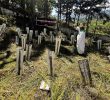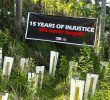Other members of the Ampatuan clan facing rebellion charges include Andal Ampatuan Sr., who has been kept inside an air conditioned hospital room of the Army’s Eastern Mindanao Command Compound in Panacan, Davao City; Zaldy, Sajid and Anwar Ampatuan, governor of the Autonomous Region in Muslim Mindanao (ARMM), the Maguindanao vice-governor and Shariff Aguak mayor, respectively.
The three have been kept at Camp Fermin Lira, a regional police headquarters in General Santos City.
Akmad Ampatuan, mayor of Mamasapano town and son-in-law of Ampatuan Sr., has also been kept at the General Santos camp.
Their hands say it all. A collage of handprints of the surviving families of Ampatuan victims during the January 16-17 psychosocial therapy sessions in Alabel town in Saranggani. (davaotoday.com photo by Cheryll D. Fiel)
Lawyers’ groups such as the Free Legal Assistance Group (Flag) in Davao and the Union of Peoples Lawyers in Mindanao (UPLM) expressed doubts that the rebellion case against other members of the Ampatuan clan will prosper.
For one, the rebellion cases were filed amid intelligence reports about several armed groups massing at different municipalities in what the government described as “a rebellion in the offing,” and some local government offices, supposedly under the Ampatuans of Maguindanao, allegedly refusing to open to the public in the wake of the massacre.
“We fear that the government’s way of dealing with the suspects and masterminds was only meant to lay the ground for the eventual exoneration of the suspects,” Lawyer Carlos Isagani Zarate, secretary general of the UPLM, said.
Widespread fears of whitewash in the prosecution of the murders came up right at the onset.
An early fact finding mission dispatched by various media groups observed poor handling of material evidences. For one, the mission observed that the use of backhoe in retrieving the bodies destroyed what important material evidences might have been left at the scene of the crime.
The report noted that the retrieval team from the military and police was “clearly assigned to achieve only the task of getting the bodies out.”
A work by the children of Ampatuan massacre victims. (davaotoday.com photo by Cheryll D. Fiel)
“There was little or no consideration for preserving the evidence,” the report which was prepared by the National Union of Journalists of the Philippines (NUJP) with the Philippine Center for Investigative Journalism (PCIJ), news organization Mindanews, and members of the Freedom Fund for Filipino Journalists (FFFJ) said.
A succeeding fact finding mission by the International Federation of Journalists (IFJ) in December took note of the absence of a proper forensic investigation and the possibility that the site had been contaminated early on.
UPLM’s Zarate expressed concern over this issue knowing how important physical evidence is in the prosecution of a criminal case.
A case that heavily relies on spoken testimony is weak, Zarate said. He added that it just takes a retraction of a witness to “unmake” the case. He also pointed out that the prosecution process heavily relies on the quality of police work.
Calls for vigilance in the justice-seeking process echo as the trial on the Ampatuan massacre case continues.
As the journalists groups bat for an open and transparent trial of the Ampatuan massacre case, lawyers’ groups call for vigilance to ensure justice.
“The families need our support,” Zarate said. He stressed that families need not only legal aid but also community action and vigilance.
Recently, a broad coalition of lawyers, media, teachers, students, interfaith groups, local government officials and professionals formed the Alliance Against Impunity in Mindanao (AAIM) to exhort the people to demand justice for the Ampatuan victims.
During a psychosocial therapy session initiated by the NUJP and Children’s Rehabilitation Center (CRC), the surviving families said it was the thought that they are working for justice, and that they are not alone, that gave them courage to deal with the loss. (Cheryll D. Fiel/ davaotoday.com)










